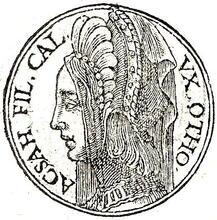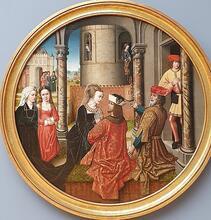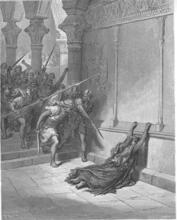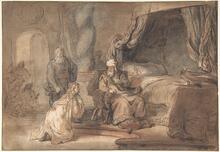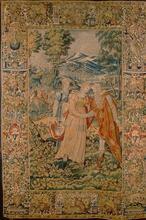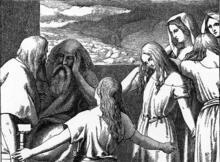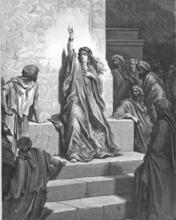Serah, daughter of Asher: Midrash and Aggadah
Serah daughter of Asher is mentioned in the Bible in the count of the Israelites who went down to Egypt (Gen. 46:17) and in the enumeration of the Israelites at the steppes of Moab (Num. 26:46). Aside from this, she takes no part in any narrative, nor is anything said about her. In contrast, a plethora of midrashic traditions exist about this woman and thus the faceless Biblical character becomes a fascinating personality. Her history is intertwined with the story of the migration to Egypt and enslavement, and with redemption and the return to Erez Israel. She lived to an extremely old age and accordingly was blessed with much earthly wisdom and knowledge, which she used to help the people of Israel as needed, even during the time of the Rabbis.
Serah and Jacob
The A type of non-halakhic literary activitiy of the Rabbis for interpreting non-legal material according to special principles of interpretation (hermeneutical rules).midrash speaks of Serah’s great beauty and wisdom: when Joseph was reunited with his brothers and sent them to the land of Canaan to bring his father Jacob to him in Egypt, he ordered them not to alarm their aged father. The brothers summoned Serah and asked her to sit before Jacob and play for him on the lyre, in this manner revealing to him that Joseph was still alive. Serah played well and sang gently: “Joseph my uncle did not die, he lives and rules all the land of Egypt.”
She played thus for Jacob two and three times, and he was pleased by what he heard. Joy filled his heart, the spirit of God rested on him, and he sensed the truth of her words. He bade her: “Continue to play for me, for you have heartened me with all that you said.” While he was speaking with her, his sons came to him with horses, chariots, and royal garments, with slaves running before them and told him: “[We bring] glad tidings, for Joseph still lives and he rules all the land of Egypt.” When Jacob saw all that Joseph had sent, he knew that they spoke truthfully. He was exceedingly happy and he said (Gen. 45:28): “[This is] enough [for me]! My son Joseph is still alive! I must go and see him before I die” (Sefer ha-Yashar, Vayigash, chap. 14).
Although Gen. 46:17 lists Serah among the seventy members of Jacob’s family who went to Egypt, the Rabbis observe that a count of the names in Gen. 46 totals only sixty-nine. Logic would dictate that Jacob himself completed the count of seventy souls, but the midrash maintains that Serah was the seventieth member of the Israelite party (Gen. Rabbah 94:9).
According to this view, she was intentionally not enumerated among the seventy, because she entered the Garden of Eden while still alive (this exegesis might be based on a tradition preserved only in the late midrash, according to which she was the daughter of Malchiel son of Elam and Hadorah, the granddaughter of Eber, and was adopted by Asher after the death of her father and her mother’s marriage to Asher. Serah was raised in Asher’s home as his daughter, but since she was adopted, she was not listed among Jacob’s seventy descendants; see Sefer ha-Yashar, Va-Yeshev, chap. 14).
Serah and Moses
The Rabbis assign to Serah an important role in identifying Moses as the redeemer who would deliver the Israelites from Egypt. The midrash relates that the secret of redemption was given over to Abraham, who conveyed it to Isaac, Isaac to Jacob, and Jacob to Joseph. Joseph transmitted the secret of redemption to his brothers, telling them (Gen. 50:25): “When God has taken notice of you (pakod yifkod), you shall carry up my bones from here” and Asher passed it along to his daughter Serah. When Moses and Aaron came to the Israelite elders and performed miracles before them, they went to Serah and told her: “A certain man has come to us and performed such-and-such wonders.” She replied, “There is no substance to him” (that is, he is not the deliverer). They then said to her: “He also said: ‘When God has taken notice of you’ (pakod yifkod).” She said: “This is the man who will redeem Israel from Egypt, for I heard from my father ‘He will take notice’ (pakod yifkod)” The people immediately believed in their God and His agent, as it is said (Ex. 4:31): “and the people were convinced when they heard that the Lord had taken note (pakad) of the Israelites.”
In the midrashic account, Serah helped Moses to fulfill the oath sworn to Joseph, to carry up his bones. When the Israelites were ready to leave Egypt, they were occupied in taking booty, and Moses was the only one who was engaged with Joseph’s bones. He searched for his coffin in all the land of Egypt but could not locate it. Serah was the only one of that generation still alive. Moses went to her and asked: “Do you know where Joseph is buried?” She answered: “They placed him here. The Egyptians made for him a metal coffin and sunk it in the Nile, so that its waters would be blessed.”
Moses then went to the Nile, stood on the bank and shouted: “Joseph, Joseph, the [time] has come for the oath that God swore to our father Abraham, that He will redeem His children. Give honor to the Lord, the God of Israel, and do not delay your redemption, because we are delayed on your account. If you show yourself, it will be well; and if not, then we are free from your oath [if you will not raise your coffin, we will go forth from Egypt and leave you here].” Joseph’s coffin immediately rose to the surface and Moses took it (Mekhilta de-Rabbi Ishmael, Masekhta Vayehi Beshalah, Petihtah; BT Suspected adulteressSotah 13a). This led the Rabbis to state that Serah delivered “the faithful one to the faithful one,” since she gave Joseph over to Moses when they departed from Egypt (Gen. Rabbah 94:9).
According to the Rabbis, not only was Serah among those who came to Egypt and one of those who left it, she also entered The Land of IsraelErez Israel; they use as a proof text for the latter claim Num. 26:46, that includes Serah among the names of those entering the land (Lit. "order." The regimen of rituals, songs and textual readings performed in a specific order on the first two nights (in Israel, on the first night) of Passover.Seder Olam Rabbah 9). An additional tradition of Serah’s longevity has her still alive in the time of King David and identifies her with the wise woman of Abel-beth-maacah. When Joab, David’s military commander, asked her: “Who are you?,” she replied (II Sam. 20:19): “I am one of those who seek the welfare of the faithful [shelomei emunei] in Israel.” In the Rabbinical exegesis, she is saying to Joab: I am one of the Israelites who went down to Egypt with Jacob. I completed [shelumai] the count of Israel [emunei Yisrael; a wordplay on the root shlm, referring both to peace-welfare and completion] to the seventy souls that went down to Egypt. Do you want to kill the entire city, and also me, who am an important woman?” In this manner Serah saved the lives of all the inhabitants of her town (Eccl. Rabbah 9:18:2).
Longevity and Death
One exegetical tradition goes even further, declaring that Serah never died but was one of the people who entered the Garden of Eden while still alive, like Enoch, Elijah, Pharaoh’s daughter Bithiah, the three sons of Korah, King Hiram of Tyre, Jabez, Jonadab son of Rechab and his descendants, Ebed-melech the Ethiopian, Abraham’s servant Eliezer, the slave of R. Judah ha-Nasi and R. Joshua ben Levi (Kallah Rabbati 3:23; Masekhet Derekh Erez, 1:18; for the various traditions, see L. Ginzberg, Legends of the Jews, vol. 5, chap. 18, 95–96, n. 67).
The tradition of Serah’s immortality is also reflected in a narrative set in the time of the Rabbis, in which Serah appears to resolve a disagreement in the academy ([jwa_encyclopedia_glossary:304]bet midrash[jwa_encyclopedia_glossary]). R. Johanan was sitting in the bet-midrash and expounding the verse (Ex. 14:22): “the waters forming a wall for them on their right and on their left.” How could the water become as a wall? R. Johanan expounded that it was a sort of [impervious] net. Serah appeared and said: “I was there, and the water was not as a net, but as transparent windows” (Pesikta de-Rav Kahana 11:13). In this midrashic vignette, Serah is an extremely old woman who can testify, in the first person, to the miracle of the parting of the Reed Sea. In her wisdom, she is capable of comprehending, and participating in, the aggadic discussion conducted in the bet-midrash. Her statement is preferred to that of R. Johanan since she has first-hand knowledge of the facts.
The traditions of Serah’s extreme longevity apparently have their basis in the fact that she is mentioned both in the count of those who went to Egypt and in the list of those who entered Erez Israel. Her singular name may also have contributed to these traditions, since the meaning of the expression (Ex. 26:12): “serah ha-odef” is “something left over” (“the overlapping excess”). This evolved into the tradition that Serah lived for hundreds of years, was in the presence of both Joseph and Moses and was even one of those who entered the land of Canaan. In the development of this tradition her lifetime extended to the period of King David and the later traditions claimed that she never died at all but entered the Garden of Eden while still alive. In the late midrash, Jacob is the one who blessed Serah that she would live forever, telling her: “My daughter, because you revived my spirit, death shall never rule you” (Sefer ha-Yashar, Vayigash, chap. 14).
The character of Serah, who accompanies the Israelites to Egypt and enters the land of Canaan with them, embodies the history of the people of Israel. Her character is linked with those of the people’s leaders, and she expedites the realization of the Divine plan. This is her role when she convinces Jacob that Joseph still lives, thus resulting in his going down to Egypt; she continues in this task when she identifies Moses as the true redeemer of Israel, thus leading the people to heed him; and thus, when she helps Moses to find Joseph’s bones, so as not to delay the Exodus from Egypt. Serah’s appearance seemingly confirms that God’s promises will be fulfilled and that the people of Israel will leave Egypt and come to and take possession of the Promised Land.

